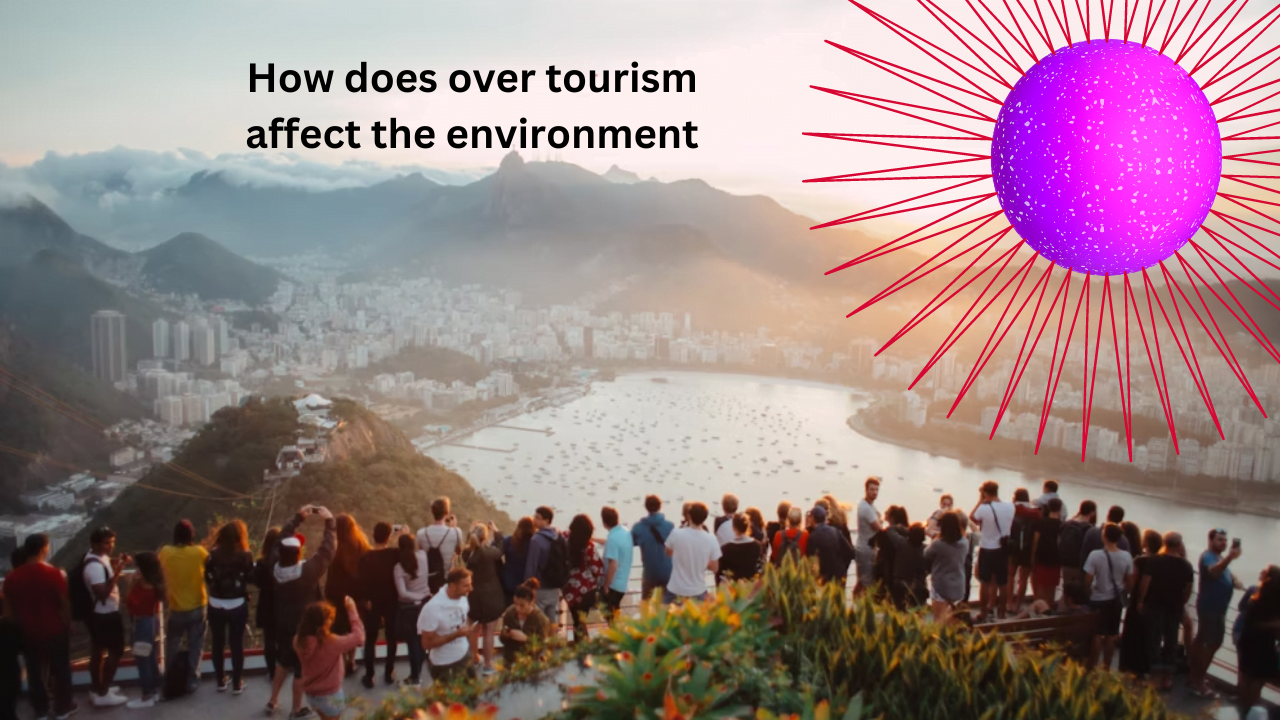Tourism, the industry that whisks us away to sun-kissed beaches and bustling cityscapes, holds an undeniable allure. But beneath the glossy brochures and picture-perfect Instagram posts, a darker reality lurks. Overtourism, the phenomenon of destinations buckling under the weight of excessive visitor numbers, casts a long shadow on our planet, threatening the very environments that draw us in.
Paradise Poisoned: Overtourism’s Shadow on the Planet
Environmental Footprints on Fragile Ground:
Imagine a pristine coral reef, teeming with vibrant life, suddenly choked by plastic waste. Or picture a once-majestic mountain trail, eroded to a dusty scar by the trampling feet of countless tourists. These are not scenes from dystopian fiction; they are the chilling consequences of overtourism.
Footprints of Destruction: How Tourism is Crushing Our Earth
Pollution: The influx of tourists strains local resources. Sewage treatment systems overflow, spewing contaminants into waterways. Waste disposal becomes a nightmare, with landfills overflowing and plastic pollution marring landscapes. Cruise ships, a hallmark of overtourism, contribute their own noxious share, spewing fumes and dumping untreated waste into delicate marine ecosystems.
Beyond the Beach: The Dark Side of Tourism’s Boom
Habitat Loss: To accommodate the tourist hordes, natural habitats are sacrificed. Forests are cleared for hotels, resorts, and souvenir shops, pushing endangered species to the brink. Delicate ecosystems like coral reefs and wetlands are trampled, their biodiversity forever altered.
Resource Depletion: Overtourism puts immense pressure on precious resources like water and energy. Local communities often face shortages, while tourist hotspots experience frequent droughts and power outages. The very resources that attract tourists become victims of their own success.
When Wanderlust Turns Toxic: Overtourism’s Environmental Endgame
Beyond the Ecological Cost:
The environmental scars of overtourism are not the only wounds it inflicts. Local communities often bear the brunt of the burden:
Cultural Erosion: The influx of tourists can disrupt traditional ways of life. Local customs and traditions are commercialized and diluted, leading to a loss of cultural identity. The charm of authenticity that initially drew tourists fades, replaced by a homogenized, theme-park version of the destination.
Don’t Get Lost in the Crowd: The Urgent Case for Sustainable Tourism
Social Displacement: As tourism booms, the cost of living skyrockets, pushing locals out of their own neighborhoods. Affordable housing becomes scarce, and traditional livelihoods are replaced by tourism-driven jobs that offer little security or stability.
Strained Infrastructure: Overtourism stretches local infrastructure to its breaking point. Transportation systems become congested, public services struggle to cope, and the quality of life for residents plummets. The paradise for tourists becomes a purgatory for those who call it home.
Navigating a Sustainable Path:
The good news is that overtourism is not an inevitable fate. By embracing responsible travel practices and implementing sustainable policies, we can chart a course towards a future where tourism benefits both the environment and local communities.
Responsible Travel: Travelers can make a conscious effort to minimize their environmental impact. Choosing eco-friendly accommodations, opting for local transportation, and respecting cultural norms are all steps in the right direction. Supporting responsible tourism initiatives and advocating for sustainable policies can further amplify the impact.
Community-Based Tourism: Shifting the focus from mass tourism to community-based models can create a more equitable distribution of benefits. This approach empowers local communities to manage their own resources, preserve their cultures, and reap the economic rewards of tourism without sacrificing their environment or way of life.
Policy and Planning: Governments and tourism authorities have a crucial role to play in regulating tourist numbers, implementing sustainable development plans, and investing in infrastructure that can handle tourism without compromising the environment or local well-being.
A Call to Action:
Overtourism is a complex challenge, but not an insurmountable one. By acknowledging its impact, embracing responsible travel practices, and supporting sustainable solutions, we can ensure that our wanderlust does not come at the cost of our planet or the communities that call it home. Let us remember that the beauty of our destinations lies not just in their postcard-perfect facades, but in their fragile ecosystems, vibrant cultures, and the well-being of their people. Let us travel with a sense of responsibility, ensuring that the footprints we leave behind are not those of destruction, but of respect and sustainable stewardship.
Remember, every conscious choice we make as travelers, every policy we advocate for, and every dollar we spend responsibly can contribute to a future where tourism becomes a force for good, enriching both the lives of travelers and the communities they visit. Let us strive to leave the world a little better than we found it, one mindful journey at a time.
